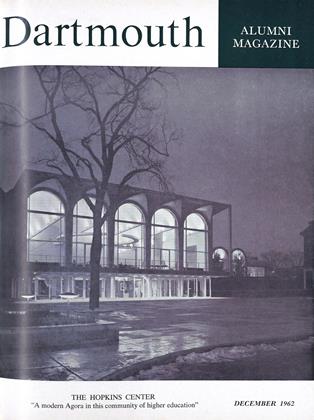ABOUT 3:30, the morning after election night, when Democrats in New England were beginning to realize that they were the chosen people and Republicans that they were not, the Dartmouth College radio station, WDCR, was just closing things down at its "Election Night Headquarters" in Robinson Hall.
All through the evening WDCR's 100man staff received returns by teletype and telephone, analyzed them and reported the totals. To house the operation, WDCR took over Robinson Hall's Little Theater. Staff members became "all-nighters" to hang bunting, arrange equipment, and in stall a wondrous communications system. Paul Jones '65, general director, could talk with people on the floor from his vantage point in the balcony merely by pressing a button.
But preparations went much further than the decorations. For more than a month a research staff under the supervision of Dan Matyola '63 had collected information on election races all over the country. Articles, pamphlets, and campaign propaganda were used in. preparing analyses of the personalities and the issues. WDCR announcers, often working on their home states, wrote five-minute background summaries that formed the bases of their reports through the evening. These reports were checked by Matyola and staff for any signs of political bias.
With reports in order and the technical system checked out by engineers Bob Gitt '63, Dave Schwartz '63, Ron Rosenfeld '63, and Sid Marshall '64, WDCR's election night broadcast went on the air. Moderator for the evening, Guy MacMillin '64, introduced the program. He credited the support of several "public spirited merchants" and turned the proceedings over to Bill Subin '63 and Sturges Dorrance '63 at the national analysis desk. After their rundown of the major campaign issues came the individual state reports.
As the broadcast switched smoothly from one area of the country to another, the refreshment crew was busy. Foresighted Walt Huss '65 had enlisted eight student nurses from Mary Hitchcock to serve coffee, doughnuts, sandwiches and soft drinks. The figures on food consumption for the night were 42 dozen doughnuts, twenty gallons of coffee, 200 sandwiches, and nine cases of Coca Cola.
About 9:00 election results began coming in. The teletypewriters printed their copy in duplicate, one sheet going to the state reporters, the other to the bulletin boards where returns were posted for visitors to the Little Theater. During the evening an estimated 1200 people looked in on the WDCR operation.
Meanwhile a special staff was putting in calls to local polling places. Pre-arranged telephone reports came from correspondents in Philadelphia, New York, Hartford, Boston, Detroit, Montpelier, and Concord. Jeff Panitt '65 discussed the returns with correspondents from a telephone installed on the stage of the Little Theater. Exciting moments came with a description of contrasting moods at the Rockefeller and Morgenthau headquarters in New York and a direct pickup from Boston of Ted Kennedy's victory speech. As the evening wore on, wire services fell increasingly behind the volume of returns, but station correspondents sent results directly.
By 3:00 in the morning most of the Eastern elections were decided, and Western trends were established. The national analysis desk gave a final report, and "Election Night Headquarters" closed.
Election Night 1962 was the most elaborate program ever undertaken by WDCR. United Press International told us that our coverage was, to their knowledge, the largest of any independent station in the country. Listeners compared it favorably with the network broadcasts. The Little Theater still shows the effects, but we'll get the place cleaned up eventually — perhaps by 1964.
"Election Night Headquarters" in Robinson Hall was the busiest place in town.
Checking incoming returnsare (l to r) Gordon Megibow'65, Brent R. Cromley'63, and Jim Kingsdale '64.
Mike MacMurray '64 catches 40 winksas the election night vigil goes on.
Guy MacMillin '64 (I), moderator,is assisted by Rob Hartford '65.
STURGES DORRANCE '63
Article
-
 Article
ArticleR. R. LARMON APPOINTED TO CRIME COMMISSION
August, 1926 -
 Article
Article'49 Alumni Fund Totals $386,611
October 1949 -
 Article
ArticleTuck School
JUNE 1965 By BOB KIMBALL T'48 -
 Article
ArticleAir Unit Assigned
May 1951 By C.E.W. -
 Article
ArticleThe Undergraduate Chair
JANUARY 1968 By JOHN BURNS '68 -
 Article
ArticleFrom a 1908 Mem Book
March 1935 By L. W. G










